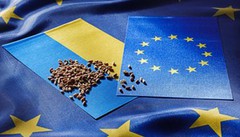The Ministry of Foreign Affairs of Ukraine and the Ambassador of Ukraine to Poland commented on the export of Ukrainian grain

The Ambassador of Ukraine to Poland, Vasyl Zvarych, reacted critically to the statement in the Polish media by the Minister of Agriculture of Poland, Robert Telus, who called the agricultural sector of Ukraine "a threat to the agriculture of the EU countries".
Vasyl Zvarych wrote about this on Twitter.
"We categorically reject such a statement by Minister Robert Telus for the PAP. A very exaggerated and unfortunate assessment in the current conditions. Today, rather, Russian grain, which freely enters the EU markets, is a threat to Polish farmers," Zvarych emphasized.
It is known that Minister Telus said in an interview with PAP that "... Ukrainian agriculture is a threat to the agriculture of the frontline countries, as well as to the whole of Europe."
According to him, Ukraine opposes the continuation of the embargo, as it contradicts the interests of "large Ukrainian concerns". He noted that "the issue is not with the government, but with Ukrainian companies, for which it is easier to transport this grain across the Ukrainian-Polish or Ukrainian-Slovak border and leave it there."
Ukraine expects that the European Commission will cancel any restrictions on Ukrainian agricultural products after they expire on September 15.
This is stated in the commentary of the Ministry of Foreign Affairs of Ukraine.
"On September 15, the European Commission's ban on imports of Ukrainian grain to EU Member States is set to expire.
Ukraine expects that after this date, the EU side will lift any restrictions on Ukrainian agricultural products. Such a step would stop violations of the EU-Ukraine Association Agreement, as well as the principles and norms of the EU Single Market.
To address the previously expressed concerns of some EU Member States, Ukraine and the European Commission have conducted systematic work within the framework of the Joint Coordination Platform. In particular, the parties reached agreements to increase the capacity of the Danube corridor, transfer sanitary and phytosanitary controls from the border to the countries of destination of Ukrainian products, monitor harvests, grain storage volumes, and trade flows at the border. In the context of developing long-term solutions, the parties also outlined steps to create new grain storage facilities on EU territory, identified alternative transport corridors to the Baltic, Adriatic and Aegean Seas, and started working on the introduction of joint customs control between Ukraine and the EU Member States.
A comprehensive data and process analysis showed that Ukrainian grain exports are not the root cause of destabilization on the EU Single Market. For the duration of the European Commission's ban and the prolonged absence of Ukrainian agricultural products, the problems of farmers in Slovakia, Poland, Romania, and Hungary were not resolved at the level of their governments. This indicates the presence of completely different factors of market pressure, including global price changes.
Ukraine welcomes Bulgaria's decision to resume imports of Ukrainian grain. We call on other neighbouring EU Member States to follow the same example.
We believe it is appropriate to emphasize that Ukraine's competitor on the global grain markets is the Russian Federation, which is not subject to any restrictions on grain exports to the EU. By artificially restraining the export of Ukrainian products, Russian Federation receives additional conditions for international expansion and resources to continue its war against Ukraine.
We believe that any decision, either at the European or national level, that will further restrict Ukrainian agricultural exports will not only be unjustified and illegal, but will also harm the common economic interests of Ukraine, EU Member States, and the entire European Union, and will have a clear destabilizing effect on the global food market," the MFA said in a commentary.
Let's remind, the Council of Ministers of Poland adopted a resolution at its meeting on Tuesday, in which it warned the European Commission that it will unilaterally extend the embargo on Ukrainian grain after September 15, if Brussels does not take a corresponding decision. It will operate until "until relations in the agrarian sphere between Poland and Ukraine are settled."
Meanwhile, the agricultural community of Ukraine calls on EU countries not to extend the ban on grain imports.
In May 2023, the European Commission banned the import of wheat, corn, rapeseed and sunflower from Ukraine to Bulgaria, Hungary, Poland, Slovakia and Romania at the insistence of these countries. On June 5, the ban was extended until September 15, 2023. These countries want to extend the import ban until the end of the year and expand it to some other goods.
The Ukrainian authorities insist that if the European Commission continues the ban on the import of Ukrainian grain after September 15, Ukraine may consider mirror measures.
The European Commission is expected to make a final decision on this issue by the end of the day on September 15.
IC UAC according to the Twitter of the Ambassador of Ukraine to Poland and the Ministry of Foreign Affairs of Ukraine
- 3050 reads





